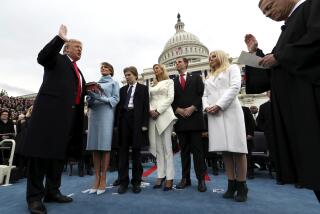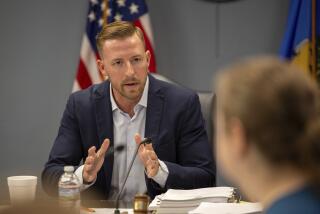Bennett Restates Role for Religion : Scores Textbooks That Ignore It, Sees Belief as Cure for Social Ills
- Share via
WASHINGTON — Education Secretary William J. Bennett, voicing his strongest support of a heightened role for religion in American society, Wednesday attacked the use of school textbooks that have “excluded religious history” and politics that are “deprived of religion.”
In a speech at the University of Missouri, Bennett called for general “public encouragement” of religious beliefs as a way of combatting social ills such as teen-age pregnancies and illegal drug use.
In the address, entitled “Religious Belief and the Constitutional Order” and delivered 199 years to the day after the signing of the U.S. Constitution, Bennett frequently invoked the names of the Founding Fathers. “All of them were comfortable with a public role for religion,” he declared, “as long as there was no preference for one sect over another.” The text of the speech was made available here.
ACLU Counsel Disagrees
Barry Lynn, legislative counsel for the American Civil Liberties Union, found fault with Bennett’s view. He declared that, among the framers of the Constitution, “it was clear that most people who had religious sentiment thought that it was private and not to be blessed by government.”
Similar criticism was leveled at a speech Bennett delivered last year that assailed Supreme Court justices for their decisions affirming separation of church and state. That speech created a furor among civil libertarians and others. In the earlier address, delivered here to the Knights of Columbus’ Supreme Council, Bennett called American values and those of the Judeo-Christian tradition “flesh of the flesh, blood of the blood.”
After that speech, Bennett said Wednesday, he was “attacked as an ‘ayatollah.’ ” He said his critics labored under a “misconception that it is somehow improper for public officials in America to speak publicly and positively about the role of religion in American life.”
Reaffirms Earlier Views
His address Wednesday night, sponsored by the university’s department of religious studies, not only reaffirmed his earlier views but broadened his attack against those who attempt to separate matters dealing with church and state.
Joseph Conn, spokesman for Americans United for Separation of Church and State, accused Bennett of “escalating his rhetoric” on the issue, a move that he said will create a backlash against the religious community.
Noting that television evangelist Pat Robertson, a possible presidential candidate, was delivering an address on the same day as Bennett’s, Conn said: “It’s an odd day in American history when you have politicians giving religious sermons and ministers giving political speeches.”
Citing a study, Bennett said U.S. textbooks “go to extreme lengths to ignore the role of religion in American history.” He said the books contain “exclusions, misrepresentations and distortions, ranging from the silly to the outrageous.”
Definition of Pilgrims
As examples, Bennett said one history book defines Pilgrims as “people who make long trips” and that another defined fundamentalists as rural people who “follow the values or traditions of an earlier period.”
“Let us pledge simply to tell our children the truth, and the whole truth, about our history,” Bennett implored, adding that it is impossible to understand the aspirations and accomplishments of mankind “without understanding the religious roots from which they sprang.”
Conn conceded that Bennett has a point about textbooks that bend over backward to avoid mentioning religion. Some publishers simply want to avoid controversy, he said. “It’s perfectly all right” to mention religion in a history class, Conn said, “but we’ve disagreed with the Reagan Administration on just how you go about it.”
Lynn suggested that the Administration, which failed in its efforts for a constitutional amendment allowing prayer in school, is using Bennett to go “through the back door to instill religious sentiment in students.”
Character Development
Bennett apparently sees no problem with that. “Children who go to church are less likely to take drugs,” he said, and there is “an inverse relation between religious belief and teen-age pregnancy.”
In addition, Bennett called religion “an important part of the development of character,” warning that Americans “should not, out of a misplaced fastidiousness, spurn the vast resources” of ethics stemming from religious beliefs.
At one point in the speech, he said: “When religion is excluded from public life, it can become resentful, extremist and sectarian. But when religion is included in public life and is subject to public scrutiny, it learns to speak in a language that all sects and all citizens can understand.”
But he warned against “zealots” who want to “promote their own particular brand of religion into a favored position in public life.” Although Bennett mentioned no name, one critic guessed he was referring to Robertson and said the remark shows that Bennett is beginning to realize “that there are real dangers from religious activists in politics.”
More to Read
Sign up for Essential California
The most important California stories and recommendations in your inbox every morning.
You may occasionally receive promotional content from the Los Angeles Times.












